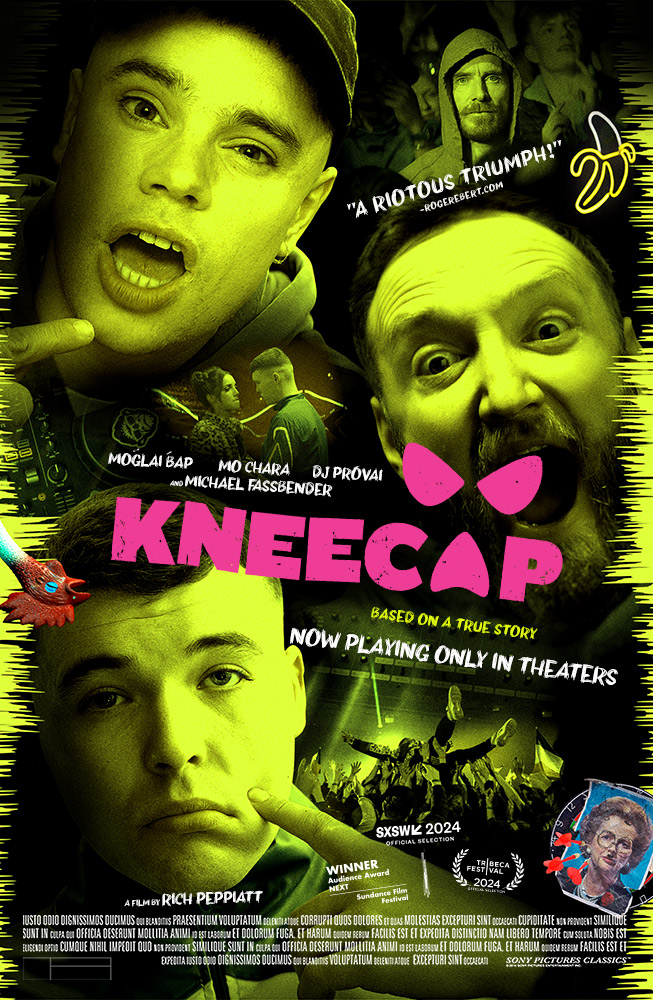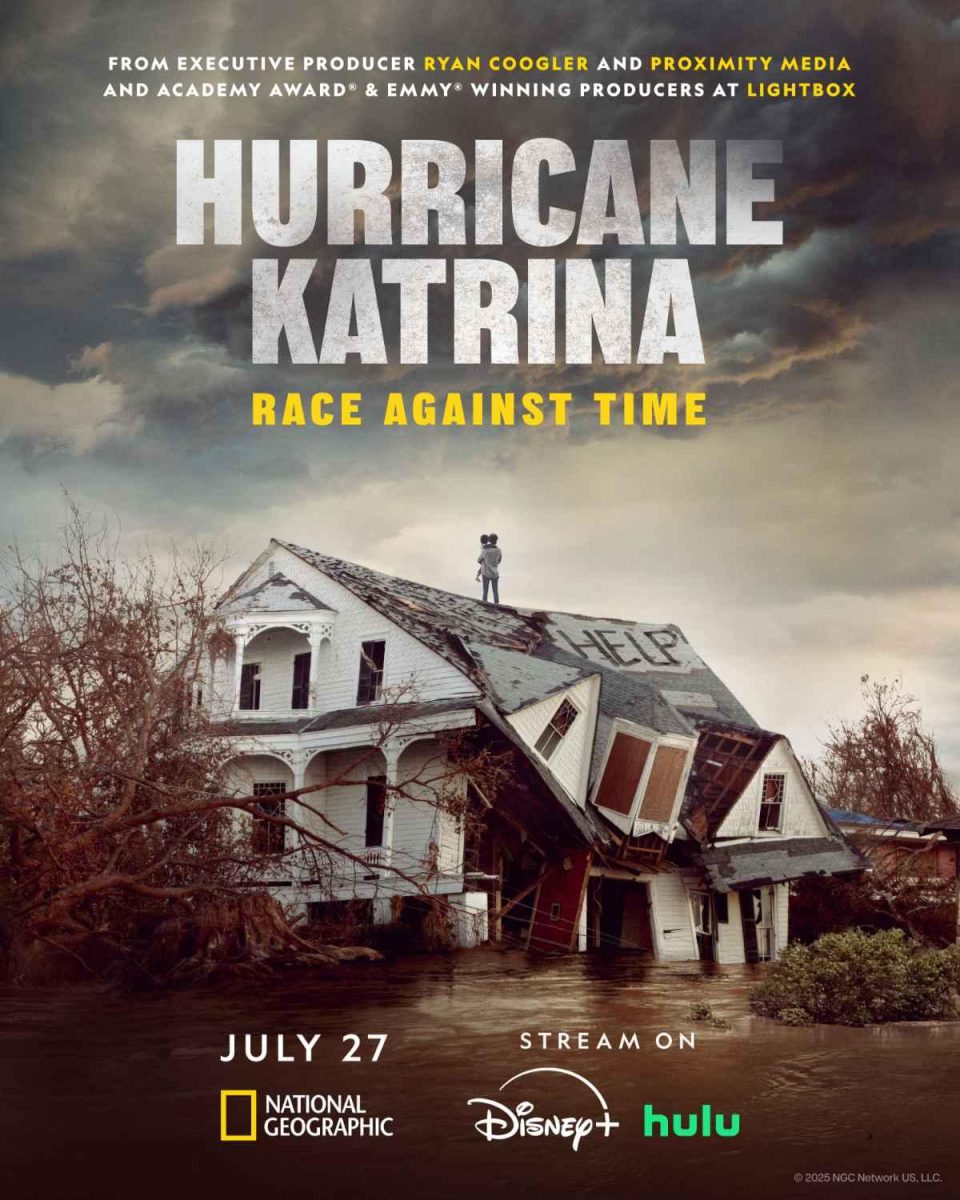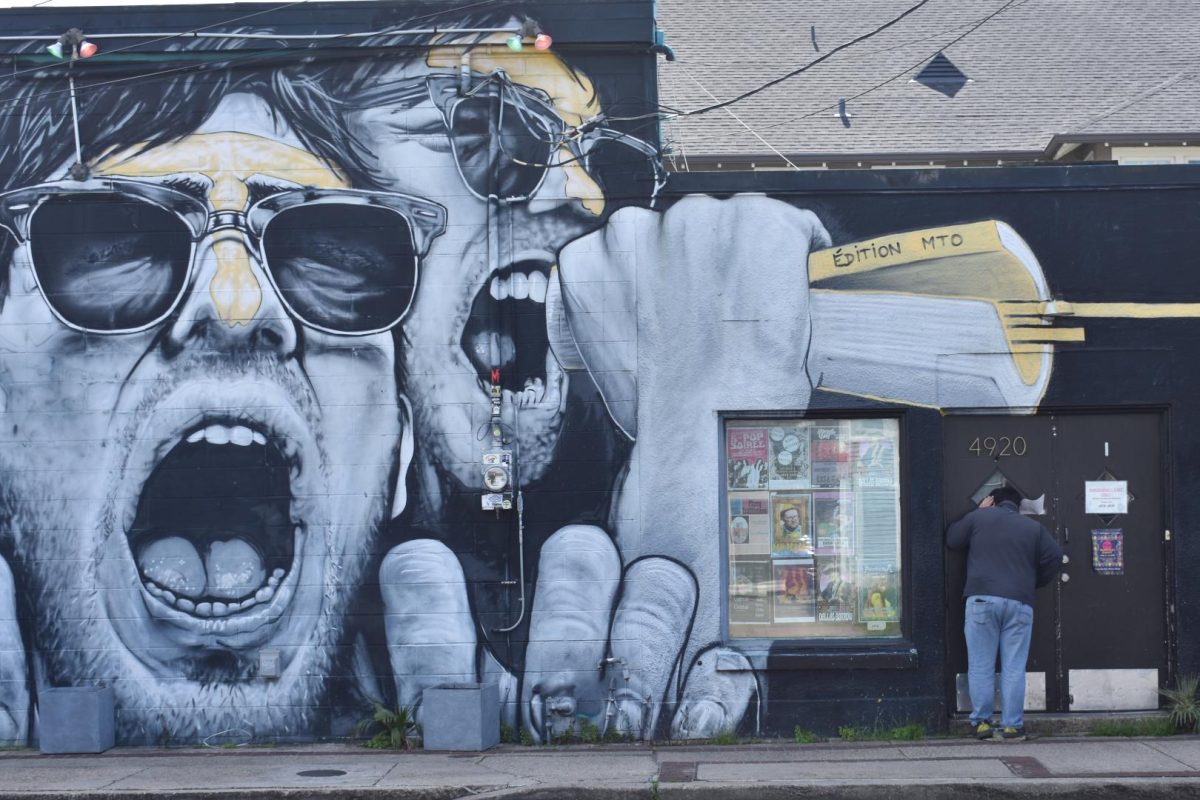Irish rap bursts onto the silver screen in the new semi-biographical dramedy film, “Kneecap,” chronicling the beginning of the titular rap trio and their place within the longstanding troubled political history of Ireland. The film, directed by Rich Peppiatt, provides a wild and deeply enjoyable viewing experience thanks to the effective directorial choices of Peppiatt, the pulsing soundtrack, infectious vibe, comedic elements, the ambitious use of the Irish language, and the exceptionally moving performances of the main cast In their first ever acting endeavor the fiery trio played by the rappers themselves are supported by an effective supporting cast made up of the likes of Michael Fassbender, Josie Walker, and Simone Kirby.
The film weaves historical fact with exaggeration to create a deeply entertaining watch. Set in the late 2010s, the films follows the experiences of low-level Irish drug dealers Mo Chara (Liam Óg Ó Hannaidh) and Móglaí Bap (Naoise Ó Cairealláin). After a run in with the police, they meet mild-mannered school teacher J.J. (J.J. Ó Dochartaigh). The trio grapple with their own sense of identity as Irish men in a country still divided by a history of British colonialism with a fierce dedication to survival of the Irish language. They decide to use hip hop as a conduit through which they can fight for their beliefs and give themselves a voice in a society that would rather leave Irish identity while also engaging in astonishing levels of drug-fueled debauchery.
There’s a lot to love in this movie. Director Rich Preppiatt, who had previously worked on music videos for “Kneecap,” was able to effortlessly transfer the high energy, chaotic, funny, and heartbreaking elements of “Kneecap”’s music to the silver screen and has even made it accessible to audiences who may not be entirely familiar with the politics and culture of Ireland, topics that lay at the heart of the music of “Kneecap.” Some of the trio’s best tracks like “H.O.O.D.,” “Guilty Conscience,” and “C.E.A.R.T.A.” are some of the most memorable parts of the soundtrack and are infectious with their sense of gleeful abandon, political fire, and astonishing blending of traditional Irish, Irish slang, and English which works to make it a truly unique experience. The use of traditional Irish, also known as Gaeilge, goes beyond just the music. The majority of the film is actually recorded in spoken Irish and to hear this language in its full expressive form is so fascinating. For me, it made me very interested in learning this language whose presence has largely waned from much of Ireland but whose resilience is appropriate for its country of origin.
The themes of Kneecap’s music carry over to the film as a whole. The film is brimming with satire and political commentary about the generational trauma that still exists for many Irish citizens, especially the youth, who find themselves with a fractured sense of identity (whether to recognize themselves as British, Irish, or an amalgamation of the two) and who find themselves struggling to live a fulfilling life in an unstable society whose police forces, who are remnants of British occupation, persecute them over their desire for cultural autonomy from British governance.
All the performances in this film are fantastic which is, in a way, shocking when you consider that for many of the main cast, this was their first time ever acting. The members of “Kneecap” are all played by their actual real life counterparts, and, for first time actors, they all do a tremendous job. The performances of Móglaí Bap, Mo Chara and JJ, also known as DJ Próvaí, all exemplify pathos within their characters and can just as easily switch from tugging at your heartstrings to laughing hysterically and even to making you wish that you could go share a pint with them. There’s no sense of chewing the scenery, just the raw honesty of the actors and the genuine bits of truth that they’ve instilled in each of the fictionalized versions of themselves. The supporting cast is nothing to scoff at either . It’s headed by Michael Fassbender, playing Móglaí Bap’s fugitive father in a truly heartbreaking role, as well as Simone Kirby and Josie Walker, who both bring a wonderfully acted sense of desperation to their roles as women trying to maintain their respective identities as Irish women, albeit on drastically different sides of the political spectrum.
Preppiatt’s direction also shows much to be commended. Many creative directorial risks like using claymation for a hallucination sequence, a penchant for montage, and a willingness to use the format of traditional biopics as a launchpad for political critique and satire are all wonderful when they come together in this film. For Preppiatt’s first actual feature length film that isn’t a documentary, he shows much promise and anything with his name attached to it is definitely worth keeping an eye out for, be it biopic, documentary, or music video.
There are, of course, some minor things that might alienate the audience. As mentioned before, a lot of jokes in the film are insular to those aware of Irish history, in particular Irish politics. Despite the otherwise large accessibility, this could still leave viewers scratching their heads. Beyond the uniquely Irish humor of the film, some people might have qualms about the thick accents of some characters or, in the case of the reading-averse, the subtitles present during the Irish speaking portions of the film. Beyond these minor and subjective qualms, I can say wholeheartedly that “Kneecap” is one of the most enjoyable film experiences of the year and certainly one of the most important political films of late. It’s a must watch for anyone whose heart beats for those oppressed by the shadow of colonialism in both present and past incarnations.
5/5








